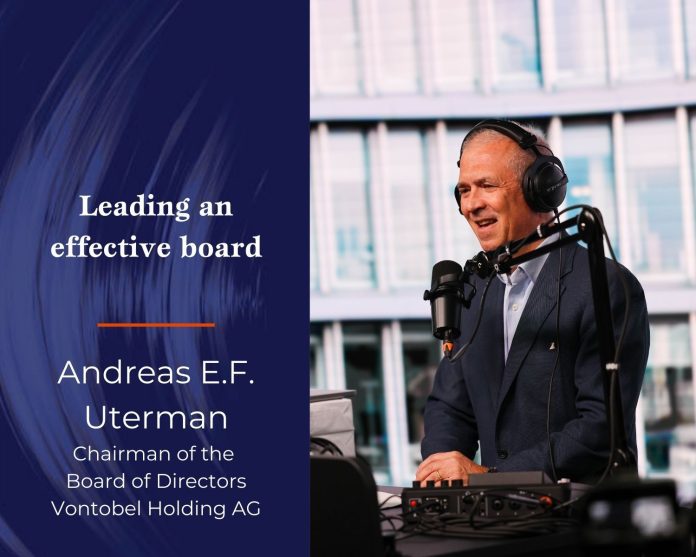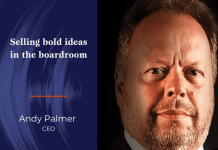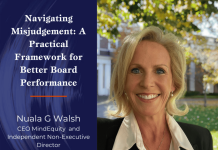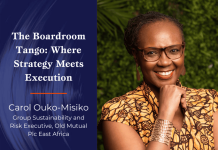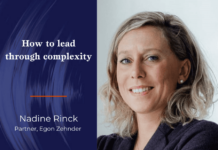The podcast and the article are brought to you by The Better Boards Podcast Series.
What does good look like? What does it mean to lead an effective board? These are probably two of the questions I most often hear. We see vast differences in how Chairs and boards perform in the board evaluations we conduct.
In this podcast, I, Dr Sabine Dembkowski, Founder and Managing Partner of Better Boards, discusses leading an effective board with Andreas E.F. Utermann. Andreas was appointed Chairman of the Board of Directors of Vontobel Holding AG in 2022. Previously, he led Allianz Global Investors, a global investment company owned by Allianz. Beginning in 2012, he initially served as a co-head and Global Chief Investment Officer. In 2016, he became the CEO, a position he held for multiple years before transitioning into an advisory role, philanthropic organizations, and external board work.
“The transition is greatly helped if you feel you’ve done what you need to do and what you thought you wanted to do as an executive”
While some executives struggle to move over to board work, Andreas feels the transition is much easier if you feel you’ve both done what you needed and wanted to do as an executive. In his case, after 36 years working non-stop, including in executive roles for companies like BlackRock and Allianz, he knew he had accomplished his initial goals. So, it was time to seek out a different type of position. Now, he can be more strategic and more focused on engaging differently with stakeholders and in more of a coaching capacity, something he finds hugely fulfilling.
Andreas also enjoys being quite hands-on with the work and getting into the details. He says being fully present with whatever is at hand, big task or small, keeps him in the moment and not wishing he was doing something else.
“Getting transparent, honest feedback individually is super, super helpful for personal development. It’s also really helpful for group dynamics”
On many boards, performance evaluations are uncommon or held for late in a board member’s tenure. Yet Andreas feels getting those conversations going right away is critically important for good governance, board futureproofing, and overall board effectiveness. So, as soon as he joined the Vontobel board, he helped initiate Board Evaluations in partnership with Better Boards. He feels opening this conversation leads to richer opportunities for personal development, board development, and improving the relationships between the board and the executive team. It improves interactions and helps drive continuous improvement – to Andreas, that’s what it’s all about.
“If you want to be successful, you need to be a contrarian”
Andreas is aware this approach to board evaluations is a little contrarian. This is intentional. Andreas credits his training as an investment professional and his upbringing by his parents for giving him the instinct to avoid groupthink and work opposite to the crowd. To him, if you want to beat the market and be truly successful, your best bet is to do something different.
A prime example of this in his current role is advocating for co-CEOs. It’s unusual, but looking at the personalities involved and the message it sends about the value of collaboration within the company, he feels it is the right strategy. Already, the results are promising and a strong expression of the way the firm has integrated the silos within the business into a more holistic model.
“Good chairs need to have a high EQ”
Being effective as a board chair these days requires a high EQ. Andreas notes that modern boards tend to be quite diverse, with strong personalities to manage. Therefore, he feels it is essential to be able to put yourself into the shoes of other board or executive team members, to see issues from their point of view and understand their position in a debate.
Along with this, Andreas feels good chairs must help create safe spaces for high-quality conversations. Having a place where people feel confident they can speak up honestly without fear of reprisal or retribution – a place with a safe feedback loop – fosters more open and productive conversations, especially on complex issues.
This does require work in between meetings. Andreas advocates for board members to make the time ahead of meetings to prepare for complex conversations. This helps keep the limited space on official board calendars dedicated to high-quality, interactive discussions and helps avoid the need to postpone key business decisions.
“The sequencing of board meetings is a significant part of a successful board meeting”
Before each board meeting, Andreas asks his assistant to block time so that he can reflect on the key topics that need to be addressed. Then, he works to organize the board meeting schedule so that the most intellectually complex and emotionally intense conversations happen early in the day or first thing in the meeting.
To Andreas, it is important to remember that board members are human. They are going to have a natural drop in attention as board meetings lengthen or in the afternoon hours after lunch. Sessions that run over time will cause anxiety. It negatively impacts the dynamic in the room. To Andreas, this is completely avoidable by giving careful forethought to the day’s schedule and striving to keep sessions on schedule.
Andreas also works to create variety in the board meetings. Rather than focusing an entire meeting on finance issues or an HR concern, he works to mix topics throughout the meeting. He feels this helps boost engagement and allows board members with different talents to have the opportunity to contribute their expertise throughout the day.
“Keep admin stuff to a minimum”
Another unique practice Andreas uses to keep his board meetings impactful is minimising the administrative aspects. He feels board meetings should be focused on strategic discussion. This is especially true for the physical meetings, when members may be flying in and flying right back out again.
So, Andreas uses a pre-meeting call to cover administrative details before physical meetings. This includes what he calls “tick box” activities for the board, such as approving minutes and routine actions. No key strategic decisions or discussions happen on these calls, but having them helps create more time during the in-person meetings for high-value discussions and strategic planning.
“I am naturally somebody who embraces change and novelty”
Andreas spends a considerable amount of his time meeting key stakeholders. It may be internal stakeholders or peers in the industry, regulators, or other outside advisors. This helps him keep a pulse on what’s happening in the industry and be aware of rising issues.
Andreas also has an active social media presence in partnership with the Vontobel media team. He shows himself as he goes about his day and in his discussions. It’s proven to be a good way to bring transparency into his role as a board chair and boost engagement from constituents who might otherwise not have given attention to board matters. So, he’s planning to continue that and to continue to experiment with tactics to enhance the world’s view of board chairs.
The three top takeaways from our conversation are:
- Be courageous. If you fail at first, try again, and keep looking at life as a learning experience.
- Be honest. If you’re no longer passionate about what you do and are not learning anything, it’s time for a change.
- Take time to reflect each day on what you’re learning and experiencing, jotting down your reflections and insights so that you can incorporate into your own personal continuous learning experience.
Don’t forget to subscribe never to miss an episode of the Better Boards Podcast Series. Available on their website, Apple, Spotify or Google.
To find out how you can participate in the Better Boards Podcast Series or more information on Better Boards’ solutions, please email us at info@better-boards.com.


